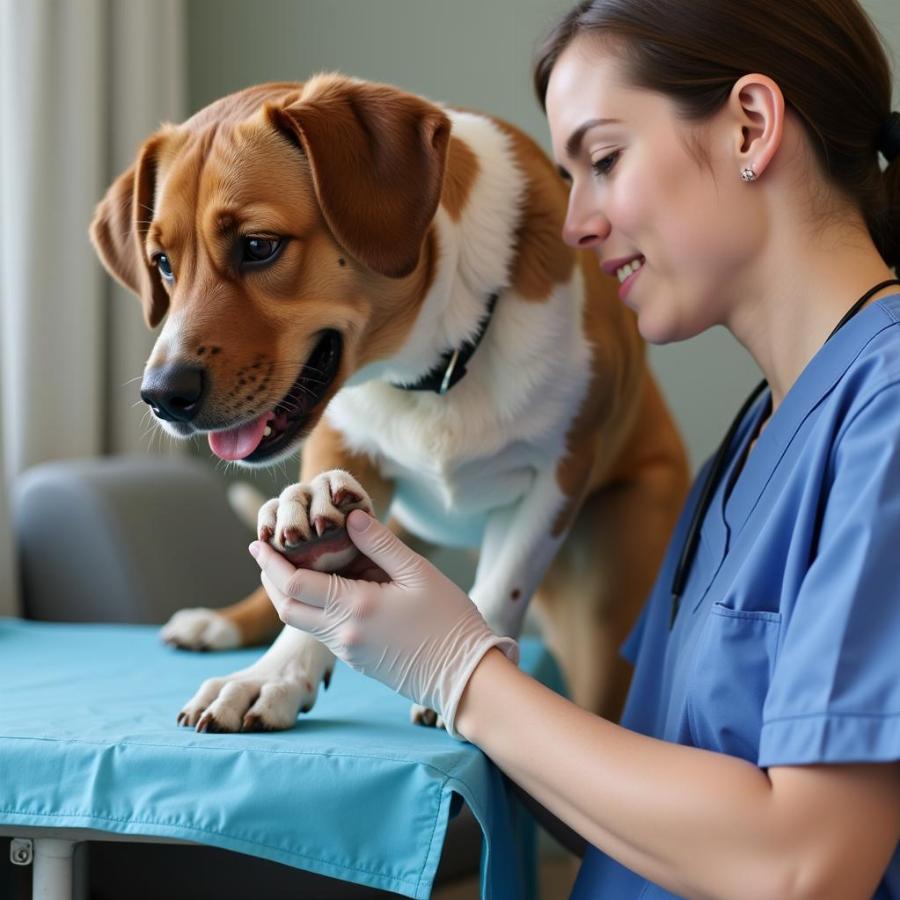Spider bites on dogs can be a serious concern, ranging from mild irritation to life-threatening conditions. Knowing how to identify a spider bite, what to do in case of a bite, and how to prevent them is crucial for every responsible dog owner. This article will provide you with a comprehensive guide to spider bites on dogs, equipping you with the knowledge you need to protect your furry friend.
Recognizing a Spider Bite on Your Dog
Identifying a spider bite can be tricky as the initial signs can be subtle. Look for redness, swelling, or pain at the bite site. Your dog might lick or chew excessively at the area. More severe reactions can include vomiting, diarrhea, muscle tremors, paralysis, or even difficulty breathing.
Common Spider Bite Symptoms in Dogs
- Localized pain and swelling
- Redness or discoloration at the bite site
- Itching or licking of the affected area
- Lethargy or weakness
- Loss of appetite
- Vomiting or diarrhea
- Muscle tremors or spasms
- Difficulty breathing or paralysis (in severe cases)
Dangerous Spiders for Dogs
While most spider bites cause only localized reactions, some spiders pose a serious threat to dogs. The two most dangerous spiders in North America are the black widow and the brown recluse. spider bite on dog paw can cause severe reactions.
Black Widow Spider Bites
Black widow venom is neurotoxic, affecting the nervous system. Symptoms can include muscle rigidity, tremors, paralysis, and difficulty breathing. Immediate veterinary care is critical.
Brown Recluse Spider Bites
Brown recluse venom is cytotoxic, causing tissue damage and necrosis (tissue death) at the bite site. The bite can develop into a painful ulcer that is slow to heal.
What to Do If You Suspect a Spider Bite
If you suspect your dog has been bitten by a spider, remain calm and act quickly. bullseye spider bite dog can be indicative of certain spider bites.
- Identify the spider if possible: Take a picture or safely capture the spider for identification purposes. This will help your veterinarian determine the appropriate treatment.
- Clean the bite area: Wash the area gently with soap and water.
- Apply a cold compress: This can help reduce swelling and pain.
- Contact your veterinarian immediately: Even seemingly minor bites can have serious consequences.
Veterinary Treatment for Spider Bites
Treatment will depend on the type of spider, the severity of the reaction, and your dog’s overall health. spider bite in dogs often require supportive care, such as pain medication, fluids, and antibiotics. Antivenin may be necessary in severe cases.
Preventing Spider Bites
Taking preventative measures can significantly reduce your dog’s risk of being bitten.
- Keep your home and yard clean and clutter-free to minimize spider habitats.
- Regularly inspect areas where spiders are likely to hide, such as woodpiles, storage areas, and under furniture.
- Use pet-safe insecticides as directed.
- Be cautious when walking your dog in areas known to have spiders. spider bite on a dog can happen anywhere, so vigilance is key.
When should I seek veterinary care for a spider bite on my dog?
Seek veterinary care immediately if you suspect a spider bite, especially if your dog exhibits symptoms beyond localized redness and swelling.
How can I tell what kind of spider bit my dog?
Identifying the spider is crucial. If safe to do so, capture the spider or take a clear photograph. what does a spider bite look like on a dog can vary depending on the spider.
Are all spider bites dangerous to dogs?
While most spider bites cause only mild irritation, some spiders, like the black widow and brown recluse, can be very dangerous.
Can spider bites cause permanent damage to my dog?
Severe bites, particularly from venomous spiders, can cause permanent damage, including tissue necrosis and neurological issues.
Conclusion
Spider bites on dogs can be a serious concern. By understanding the signs, knowing what to do in case of a bite, and taking preventative measures, you can help protect your dog from the dangers of spider bites. Early recognition and prompt veterinary care are crucial for the best outcome.  Điều trị nhen cắn chó
Điều trị nhen cắn chó
Expert Insight: Dr. Emily Carter, DVM, emphasizes, “Never underestimate the potential severity of a spider bite. Even if the initial reaction seems mild, it’s always best to consult a veterinarian.”
Expert Insight: Dr. Michael Davis, a veterinary toxicologist, adds, “Knowing the types of spiders common in your area can help you assess the risk and take appropriate preventative measures.”
Beaut Dogs is your trusted source for comprehensive and reliable information on all aspects of dog ownership. We are dedicated to providing expert advice and guidance to help you care for your canine companion. For further assistance, please contact us via Email at [email protected]. We at Beaut Dogs(https://beautdogs.com) are here to help.